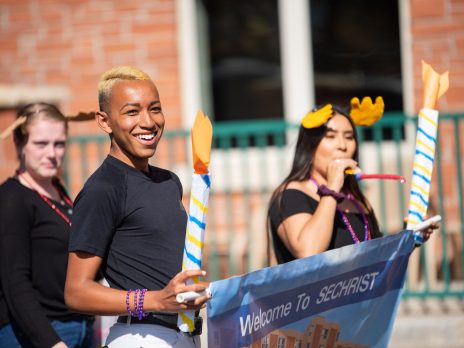Contact Us
 True Blue Connects
True Blue Connects
Advisor Do’s & Don’ts
The advisor who simply lends their name to an organization to fulfill a requirement does a great disservice to that group. Effective advising requires a variety of skills normally associated with teaching or counseling. See below to see how you can be an effective, high impact advisor
Advisor Do’s
- Read the Student Organization Advisor Manual. Become familiar with this guide.
- Respect the group’s autonomy. Students are learning new skills and finding out more about themselves as they navigate leading their clubs. Instead of stepping in to avert issues, wait to see if the students figure out the issues themselves. As an advisor, you are there if the students ask for your help.
- Be reliable. Be responsive when students seek your advice. Reach out so you can stay informed about the group’s plans and aspirations; ask helpful questions so you understand the processes and help them to. Watch the group dynamics, and listen to the members. Develop your knowledge and perspective so when students seek your advice, you’ll be prepared to give it — or better yet, to guide their own understanding. Attend events when you can.
- Be supportive. Get to know group members as well as group leaders, so you can be an advisor for the whole group. Serve as a sounding board, counselor, motivator, and resource person. Above all, share your enthusiasm for the group and the individuals who comprise it. Let them know when they’re doing a great job, and help them when they’re struggling.
- Know how to access resources and information. Seek out answers and if need more help reach out to the Student Organization Development team.
- Connect. Meet regularly with the group leaders. Challenge them while effectively supporting them. Aid in the development of essential leadership skills. Be present.
- Let them fail. Great learning occurs when things don’t go as planned. Within reason, it is okay to let a decision stand even when you know it could fail. The follow-up conversation will be key to ensure learning has occurred.
Advisor Don’ts
- Run the organization/club. Remember that ALL NAU clubs and organizations at NAU are required to be student-run, student-led, and student-managed.
- Assume ultimate responsibility for organization decisions, problems, and failures. Remember this is their organization to build. Your job is not to solve all of their problems.
- Run organization meetings. The student officers are tasked with this. This gives them the opportunity to build leadership skills, practice group facilitation and is key to their learning.
- Serve as primary recruiter or marketer for organization and its programs. Event if you have skills in this area, the organization is for the students to run and facilitate. Support them while ensuring they are putting in the work.
- Assume the organization doesn’t require your guidance and assistance. They do require it. Even high functioning organizations need support and someone to root for them. Additionally, you can help ensure they are reflecting on their experiences so they connect these lessons to their future careers.
- Be afraid to try new ideas. The beauty of student organizations is the ability to take risks, do something new and ensure the club is evolving.